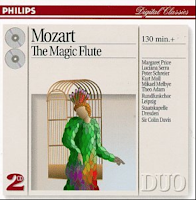Die Zauberflöte
1984, Philips
(Peter Schreier, Margaret Price, Mikael Melbye, Luciana Serra, Kurt Moll, Robert Tear; Rundfunkchor Leipzig; Staatskapelle Dresden, cond. Colin Davis)
This was the first Flute recording I ever heard and one of the first complete opera recordings I ever owned. Part of my attachment to it may be nostalgic, but still I think I can safely call it one of the best Flutes available. Sir Colin Davis offers an excellent, quintessentially modern reading of the score: slower and heavier than a period instrument performance, yet lighter and livelier than the post-Romantic readings of Klemperer, Böhm and their ilk. The balance he strikes between lofty gravitas and fairy-tale joy is absolutely perfect.
Peter Schreier’s third studio Tamino proves him to be eternally reliable and charming in the role. True, his voice is dryer and less sweet than other tenors, but the warmth and feeling of his singing compensate almost completely. At his side is a lovely Pamina, Dame Margaret Price, whose warm yet pure, jewel-like tone and heartfelt emotional expression are ideal for Mozart. Mikael Melbye is an endearing Papageno with a rich, lusty baritone and vivid comic energy; he makes the bird-catcher a bit of a ham (“Ooooh weh!”), but the claim I’ve read that he “squawks through the role instead of singing it” is thoroughly untrue. As the Queen of the Night, the delicately creamy-toned Luciana Serra offers a voice more “pretty” than “thrilling,” but her coloratura is spot-on, and she conveys fitting tenderness in her first aria and hauteur, if not fire, in the second. Kurt Moll, meanwhile, is an ideal Sarastro, the warm, rumbling grandeur of his bass bringing an appropriate “voice of God” quality to his music. In addition to these principles, the formidable, exuberantly sneering Monostatos of Robert Tear, the warm-toned Speaker of Theo Adam, a truly luxurious trio of Ladies (Marie McLaughlin, Ann Murray and Hanna Schwarz), an excellent trio of Boys, and a first-rate chorus make this truly a Flute to remember. The recording exists in two separate versions: one that includes the spoken dialogue (spoken by actors instead of the singers, with the exception of Melbye's Papageno), and one that omits it. The dialogue-free version is more widely available, however.
While I don’t think any Zauberflöte can really be called definitive, this is one of the greatest and a must-hear for any lover of the opera. At any rate, it’s the recording that made me fall head-over-heels in love with Mozart’s music.
(Review originally posted on Pamina's Opera House)



First of all...thank you for the nice review. A small story: The dialogue is done by actors....is true but for me. I insisted, risking the contract, doing my own dialogue and made a bet with Joachim who directed the actors doing it. If he didn't like what I did, I would step down. The actors are fine, but I must admit that I would have preffered everyone to do their own dialogue since the voices would macht the sining better. Just a little story. Another is that half way during the recording I got chicken pocks and went on doing the rest of the recording standing behind a plexiglass wall so not to give the pocks to the rest of the cast. And I looked loke a wondering pizza by the way. Another little story. All the best Mikael
ReplyDeleteThank you for such a friendly comment. I've always enjoyed your performance as Papageno and I've just now ordered a copy of the recording that includes the spoken dialogue so I can hear you there too. You also have my applause for completing the recording while you were sick! It didn't effect your vocal performance one bit!
Delete